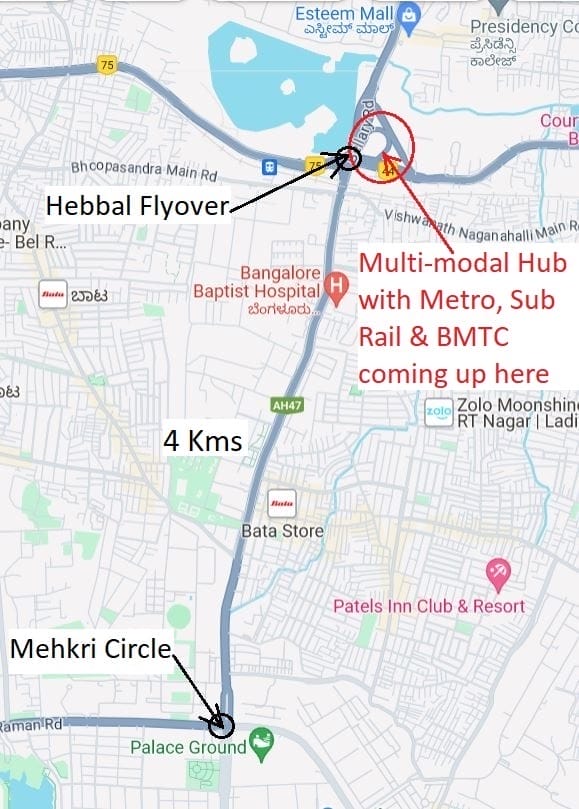In October 2023, Deputy Chief Minister/Bengaluru Development Minister, DK Shivakumar, had announced a 190 kilometre-tunnel road as a solution to ease Bengaluru traffic. In May 2024, the Bruhat Bengaluru Mahanagara Palike (BBMP) announced its initial phase plan to construct an 18 kilometre-tunnel road connecting Hebbal and Central Silk Board. This road will include five entry and exit points for vehicles.
A tunnel road is an underground passageway for vehicles to travel through. It provides a direct route through an obstacle, such as a mountain or body of water, which would be otherwise impractical or impossible to traverse through by vehicle. In Bengaluru, however, no such topological challenge exists.
Unfortunately, the Government of Karnataka is far from exhausting all other relatively easier options available. It has also failed to instil confidence of completion of such projects in stated time and cost. Ejipura Flyover, started in 2017, is still languishing. Work on Bengaluru Suburban Rail Project is moving at a pace which is an insult to snails. Also, there has not been any popular demand for tunnel roads in Bengaluru. In fact, when we put up a 48-hour open public poll on 8 March 2024, giving two options, 91.9% voted for better public transport and only 8.1% voted for tunnel roads.
With low transparency in such a major and first-time proposed project for Bengaluru, one has to go by what is available in the public domain. Unfortunately, even in this, there is no consistency. For example, there are reports of the project costing from as low as Rs. 300 crores per kilometre to Rs. 690 crores per kilometre. Even the routes, the length, the executing agencies, etc. have been changing. The latest in this series is that the BBMP is planning an 18 kilometre-tunnel road system at a cost of Rs. 8,000 crore and planned for completion by the end of 2024!
The proposed tunnel road raises important questions
The government’s move to building the first four kilometre-tunnel road raises many questions, some of which are:
- Is a tunnel road really required at this stage along this particular stretch?
- By the time it is ready, will this tunnel road be of any use at all?
- Is it worth all the costs, risks, challenges, etc. ?
- Do we have any alternatives?

Read more: Before Bengaluru gets bored with tunnel roads
Factors to be considered
- Lack of a comprehensive study and public consultation:
- The Karnataka Government’s Directorate of Urban Land Transport (DULT) should have conducted a thorough study for this stretch and for this project
- It is mandated that new projects like this should involve the Bengaluru Metropolitan Land Transport Authority (BMLTA)
- Transparent stakeholder and public consultations are essential, especially for such a major and first-time Project
But there’s no evidence that these steps have been taken.
- Congestion and existing conditions:
- The four kilometre-stretch between Hebbal Flyover and Mehkri Circle experiences congestion mainly at the two ends – at Hebbal Flyover and Mekhri Circle – and more so for the flow of traffic towards the city from the airport (North to South)
- Construction of a new ramp near Hebbal Flyover is underway and will improve traffic flow on the flyover
- The current road between these two ends is wide, has service roads on both sides, and features three underpasses and a skywalk. It is also 100% signal-free.
- Tunnel Road Project impact:
- The proposed Tunnel Road Project will encourage more private vehicles (especially cars), exacerbating congestion, more so on surface roads, which will be counter productive in decongesting the roads.
- Disruptions during construction:
- As a major route to/from the airport, this stretch is sensitive to disruptions
- During the 3-4 years of construction, severe traffic disruptions are expected at both ends and other entry/exit points, including the surrounding areas.
- Unique risks associated with tunnel roads:
- Tunnel roads pose risks during and after construction:
- Structural damage
- Services (cables, pipes) affected during construction
- Accidents within the tunnel
- Accumulation of noxious and inflammable gases
- Adverse effects on water table, aquifers, wells, borewells, lakes, etc.
- Fire hazards
- Flooding, poor drainage
- Landslides
- Challenging access for emergency vehicles inside the tunnel.
- Tunnel roads pose risks during and after construction:
- Unintended impact:
- Ironically, tunnels may worsen congestion rather than alleviate it.
Part 2 in this series will focus on alternatives to tunnel roads.
Pretty interesting and insightful analysis.I find it very likable and debate worthy.
In my personal opinion the total amount of money spent on Bangalore, over several decades, could probably be Rs.50,000 Crores. To Decongest Bangalore just build Satellite Townships 100 kms out of Bengaluru-to the North South East & West. Provide high speed rail and road connectivity. Provide world class recreational, Educational & Medical facilities. It might actually be a cheaper and more permanent solution.